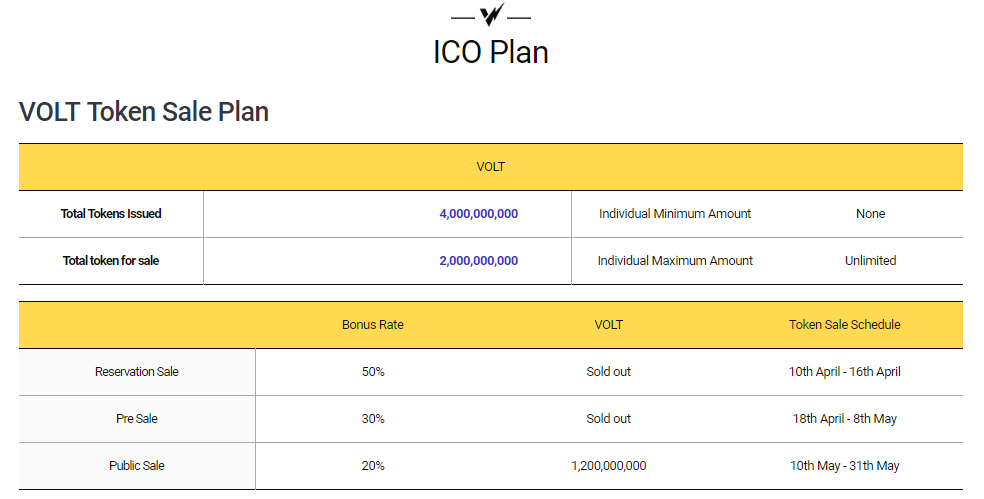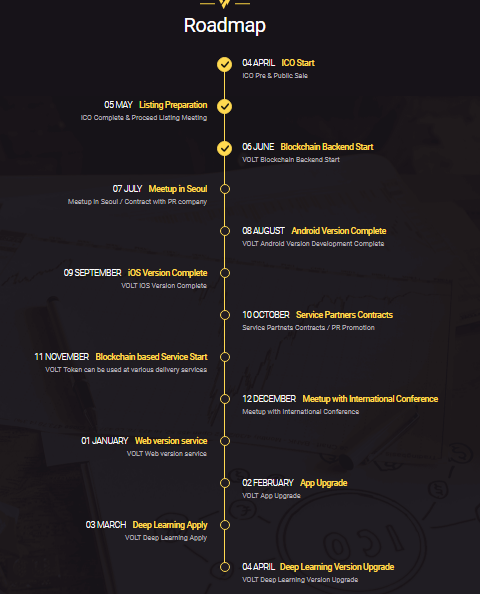
The existing delivery model is a centralized model, with a system called Hub & Spoke. This centralized model, including DHL, has dominated the worldwide shipping market. However, the centralized model can not meet the shipping requirements on the same day. VOLT is a blockchain-based P2P delivery model that completes the same day delivery restrictions more effectively than existing models.
How it works in the Market
The VOLT business model connects customers and couriers, and provides customized algorithms that utilize Big Data and a suitable system that uses smart contracts for easy service delivery. Customers need VOLT coins to use this service.
When delivery of food, goods, shipping distance, time taken, taking into account the weight of the goods will be determined in accordance with the number of difficulty of work. We call this work unit "Jula". For example, if the customer wants to send the item to a point called A 2km away and you need 600 Jula, and 1200 Jula is required to send the same item to B point 6km away. VOLT is developing an optimal algorithm to calculate this amount of work, and will introduce the lowest (auction) auction system for some special shipments.
Hierarchy
VOLT is a decentralized platform. There are no brokers or brokers, leading to lower offerings for customers, as well as maximizing profits for message senders.
Transparency
In VOLT, we provide a transparent environment. All customers and transport or transportation companies benefit from the confidentiality and transparency of fees and fees.
How does it work?
The VOLT business model connects customers and traffic and provides custom algorithms that use Big Data and smart contract-based matching systems to easily distribute services. Customer requires VOLT to use this service.
When transporting food, goods, transportation distance, the time taken, taking into account the weight of the goods will be determined in accordance with the difficulty of the work. We call this unit "Jula". For example, if the customer wants to send to a point called A 2km and you need 600 Jula, and 1200 Jula is required to send the same item to B 6km. VOLT develops the optimal algorithm to calculate this amount of work and will introduce the lowest auction system (bid) for some special shipments.
VOLT currency is required for service buyers to request delivery. That is, to request some performance of Jula, the appropriate VOLT coin is used. The currency ratio from Jula to VOLT is not always the same. The first VOLT coin rate starts at 1: 1. Rates may change based on market price. Client
Decentralization
VOLT is a decentralized platform.
There is no intermediary or brokerage, which leads to lower cost offered to customers, and also maximize profits for the messenger.
Transparency
At VOLT, we offer a transparent environment. All customers and couriers or shipping companies benefit from privacy and transparency of costs and expenses.
Security
A secure payment system that allows two P2P entities is confirmed to send and receive money held in Token VOLT until after successful service exchanges between the parties.

A client who needs administration can buy an Exchange coin. A customer will buy 100 coins for a transport benefit that costs 100 coins. The customer will pay 100 coins to VOLT where VOLT connects the request to the dispatcher. After administration is complete, VOLT swap 95 coins at the dispatcher. Approximately 5% (tariff can be changed in accordance with reinforcement benefits) of the currency is used as a commission for the benefit of the organization. The organization offers the currency earned to the exchange to generate revenue.
Earnings are used to defend the organization or provide benefits to VOLT investors, but not to coin holders. If this procedure is cyclical, the demand for currency will definitely outweigh the Exchange offer, which will result in higher costs for the currency. Combination of calculation and current currency value, VOLT change currency / Jula rate. In the long term, Jula's currency / rates will increase, and along this line you'll be ready to have top Jula with 1 VOLT Coin. In addition, he then builds Jula's estimates.

- Total Token issued: 4,000,000,000
- Total tokens on sale: 2,000,000,000
- Reserve sales: 200,000,000
- Presale: 600,000,000
- General sales: 1,200,000,000
Exchange with other currencies will only be available after the token sale expires.
ROAD MAP:

Team and volt adviser
Philip Lee (CEO)
Philip Lee is CEO and founder of Volt Tech Ltd. He received his master's degree from UCLA. Philip has made Quick Quick an online and offline service company that reduced the cost of shipping the last mile by implementing a Uber style delivery system. Currently, VOLT (brand: Quick Quick) is the largest provider of last mile delivery service in Korea.
Sangchun Shim (CSO)
Dr. Sangchun Shim brings 30 years of experience from KT (Korea Telecom). He is known as a 'rainmaker' at KT; He has management experience and has transformed 55 affiliates from a total loss of $ 42 million to a profit of 140 million in just 2 years. Dr. Shim also leads the successful acquisition, the latest value, and the sale of "Kumho-Rent-Car". The company was acquired for $ 300 million and sold to Lotte Group for $ 1billion by 2015. Shim received an MBA from George Washington University with a specialization in MSTI (Management Science, Technology and Innovation) and a PhD at Hanyang University.
Jieun Dino Lee (co-founder and board member)
Jieun Lee is one of the founders of QuickQuick (former VOLT brand), and is currently a non-executive board member. He is also the founder of LightUp, a service that provides a communication platform for consumers and companies to meet for social change. Jieun has worked for global investment banks such as Lehman Brothers, Credit Suisse and UBS as interns to gain their business expertise. He graduated from the University of Michigan, specializing in Economics.
Gyeongrae Cho (Leader of Marketing and Sales Team)
Mr. Cho is our VOLT sales team leader. Previously he worked with Haitai Group, Pantech and Nokia in business and sales analysis. With his knowledge in the field of technology, he specializes in industry sales based on technology. He graduated from Korea University with a specialization in Engineering.
JaeWoo Lee (Counselor)
Mr. Jae Woo Lee is co-founder and CEO of Vogo Fund Asset Management Co., widely recognized as Korea's first private equity fund management company. Before establishing Vogo in 2005, Mr. Lee is the CEO of Lehman Brothers Korea, where he creates an important investment banking and capital market platform. Since starting his financial career at Citibank, he has spent the last 35 years in various areas of finance in Hong Kong and Seoul. Mr. Lee has led the Korea Personal Equity Association for several years and advises the Korean government as a member of the Financial Market Development Committee.
For more information :
Website: https://volttech.io/
Twitter: https://twitter.com/Volt_Technology
Facebook: https://www.facebook.com/VoltTechnology1
Instagram: https://www.instagram.com/Volt_technology
Telegram: http://t.me/voltico
Author: carens
Eth: 0x9e5C152D04eF2649de36146aFc97919be8C2E3D9

Tidak ada komentar:
Posting Komentar